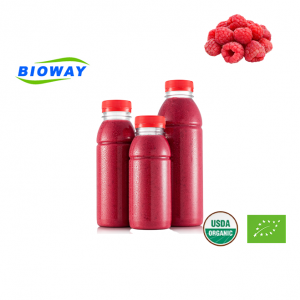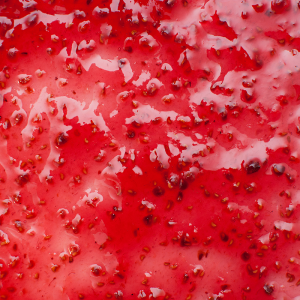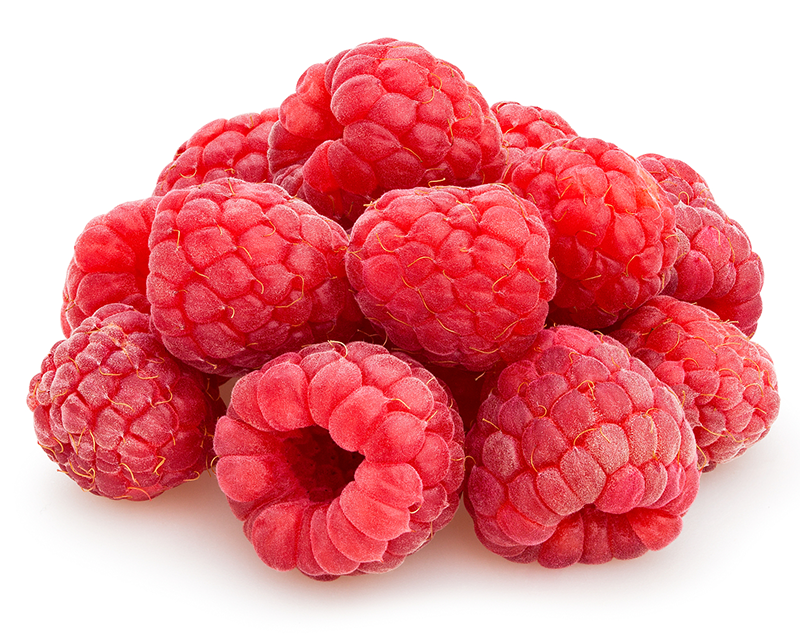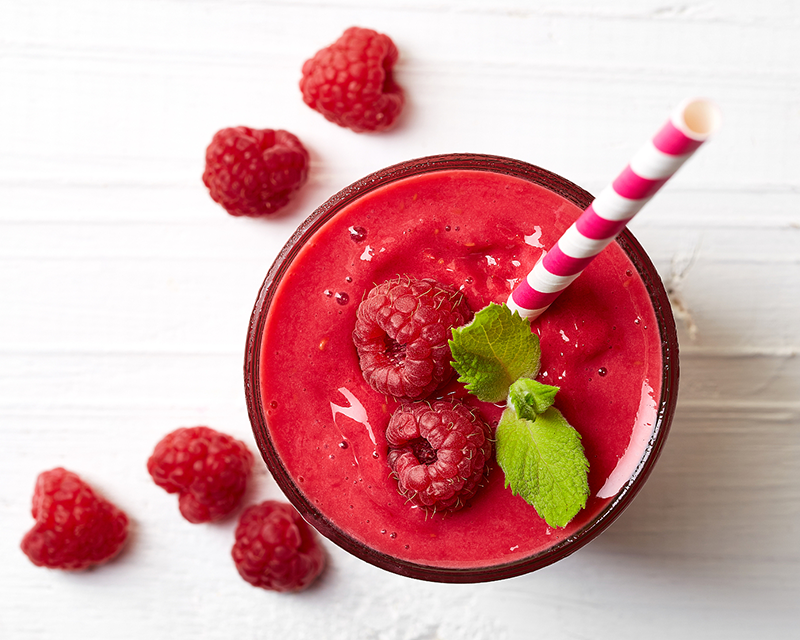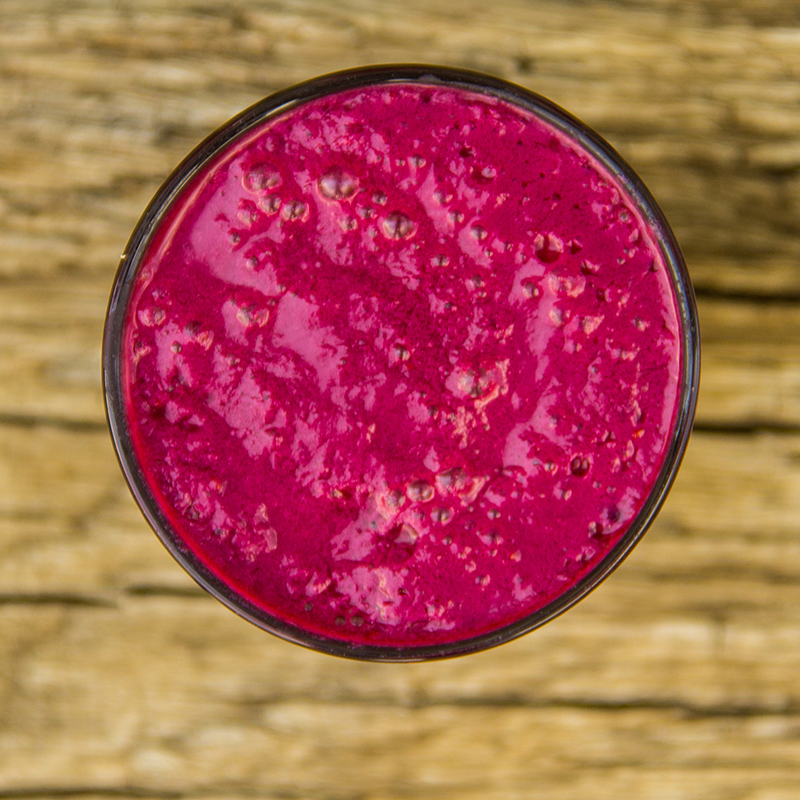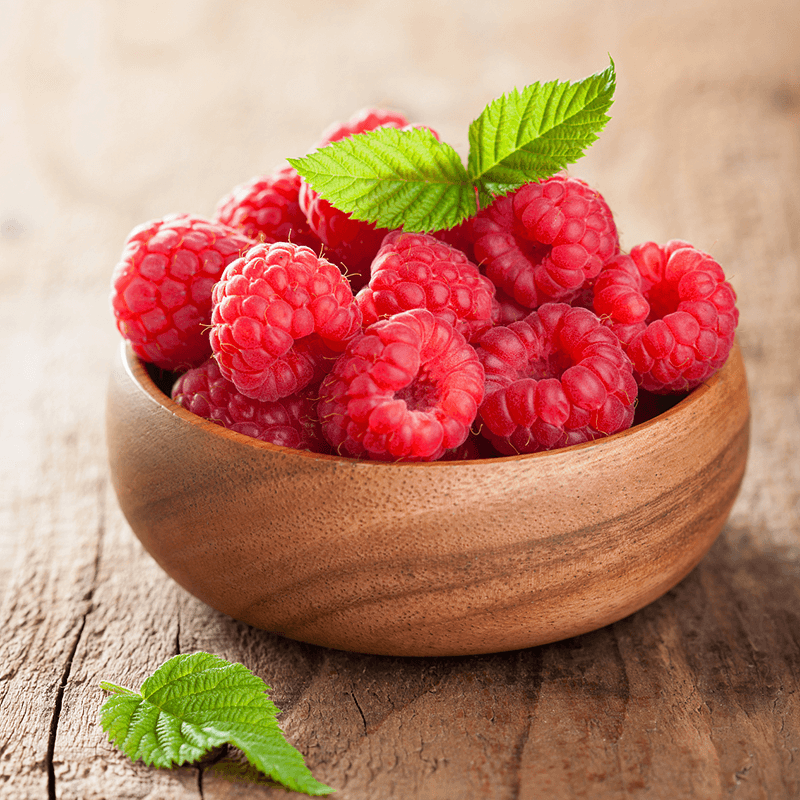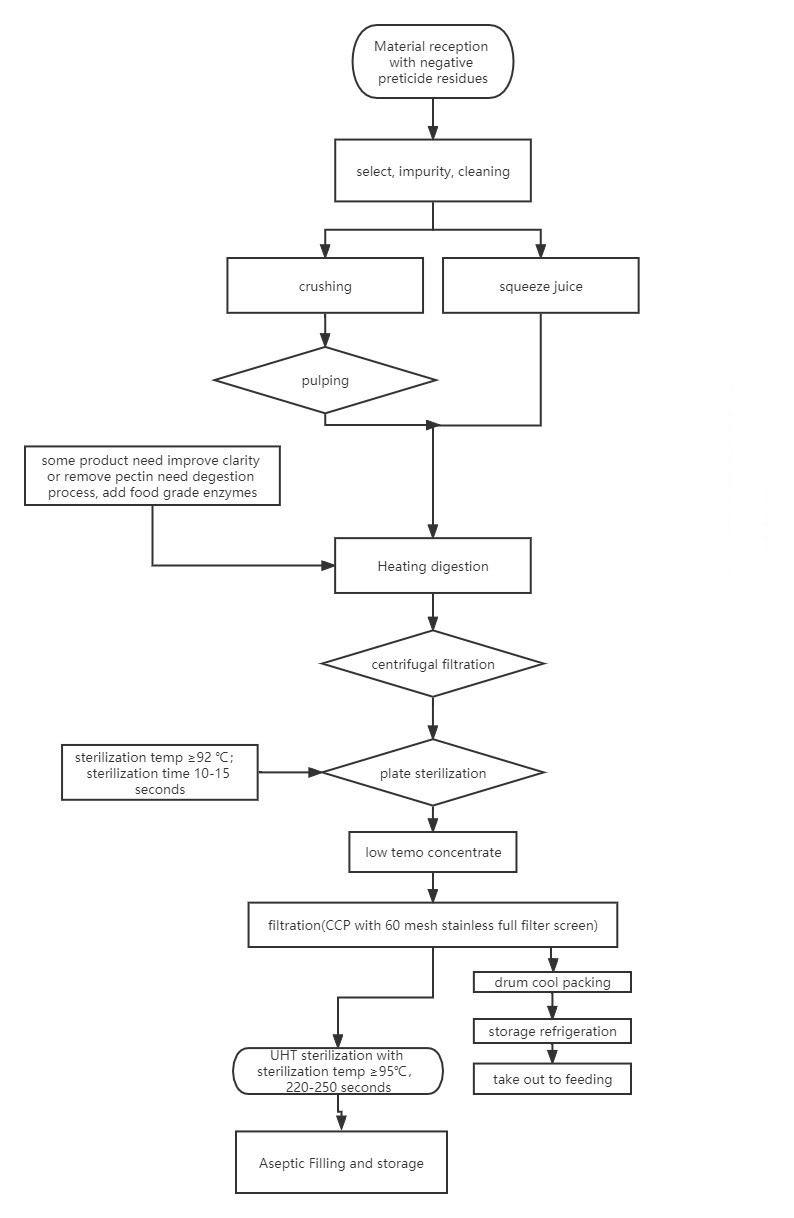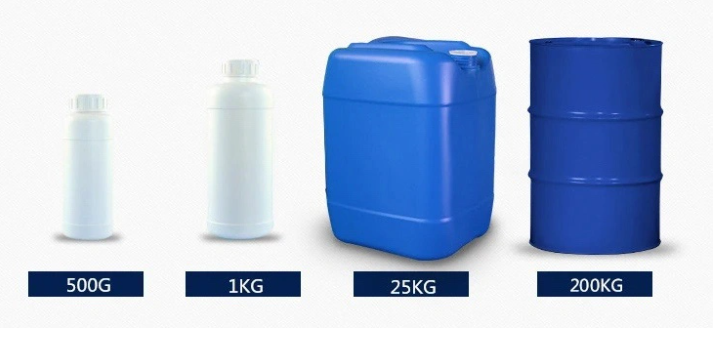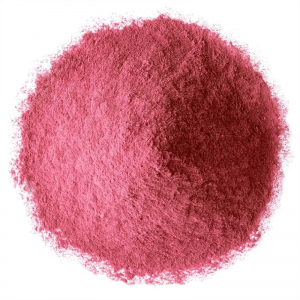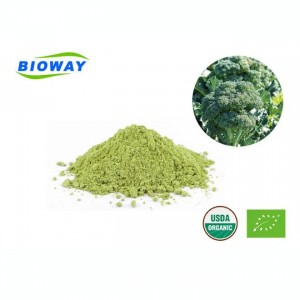Premium Raspberry Juice Concentrate with Brix 65~70°
Premium Raspberry Juice Concentrate refers to a high-quality, concentrated form of raspberry juice that has been processed to remove water content, resulting in a more potent and concentrated product. It is typically made from freshly harvested raspberries that undergo a thorough juicing process and then undergo filtration and evaporation to remove excess water. The end result is a thick, rich, and intensely flavored raspberry concentrate.
It is often considered superior due to its high fruit content, minimal processing, and the use of premium-quality raspberries. It retains the natural flavors, nutrients, and vibrant color of the raspberries, making it ideal for a range of applications such as beverages, sauces, desserts, and baking.
The premium aspect of raspberry juice concentrate can also refer to the production methods used. This may include cold-pressing the raspberries to maintain the freshness and quality of the juice or using organic raspberries that have been grown without synthetic pesticides or fertilizers.
Ultimately, this juice concentrate offers a concentrated and authentic raspberry flavor, making it a popular choice among individuals and businesses seeking high-quality ingredients for their culinary creations.
| Certificate of Analysis | |
| Items | Specification |
| Oder | Characteristic |
| Taste | Characteristic |
| Paiticle size | Pass 80 mesh |
| Loss on drying | ≤5% |
| Heavy metals | <10ppm |
| As | <1ppm |
| Pb | <3ppm |
| Assay | Result |
| Total Plate Count | <10000cfu/g or <1000cfu/g(Irradiation) |
| Yeast & Mold | <300cfu/g or 100cfu/g(Irradiation) |
| E.Coli | Negative |
| Salmonella | Negative |
Nutritional Information(Raspberry Juice Concentrate, 70º Brix (Per 100 grams))
|
Nutrient |
Amount |
| Moisture | 34.40 g |
| Ash | 2.36 g |
| Calories | 252.22 |
| Protein | 0.87 g |
| Carbohydrates | 62.19 g |
| Dietary Fiber | 1.03 g |
| Sugar-Total | 46.95 g |
| Sucrose | 2.97 g |
| Glucose | 19.16 g |
| Fructose | 24.82 g |
| Complex Carbohydrates | 14.21 g |
| Total Fat | 0.18 g |
| Trans Fat | 0.00 g |
| Saturated Fat | 0.00 g |
| Cholesterol | 0.00 mg |
| Vitamin A | 0.00 IU |
| Vitamin C | 0.00 mg |
| Calcium | 35.57 mg |
| Iron | 0.00 mg |
| Sodium | 34.96 mg |
| Potassium | 1118.23 mg |
High fruit content: Our concentrate is made from premium quality raspberries, ensuring a rich and authentic raspberry flavor.
High brix level: Our concentrate has a brix level of 65~70°, indicating a high sugar content. This makes it a versatile ingredient suitable for various applications, including beverages, desserts, sauces, and baking.
Intense and vibrant flavor: Our concentration process intensifies the flavor, resulting in concentrated raspberry essence that can provide a burst of flavor to any recipe.
Versatility: It can be used in various culinary applications, making it attractive to a wide range of businesses such as juice manufacturers, bakeries, restaurants, and food processors.
Premium quality: The product is made using premium raspberries and undergoes a meticulous production process to maintain its quality, flavor, and nutritional benefits.
Wholesale pricing: It is available for wholesale purchase, making it an ideal choice for businesses in need of larger quantities of raspberry concentrate at a competitive price.
Shelf stability: The concentrate has a long shelf life, allowing it to stock up and have a consistent supply of high-quality raspberry juice concentrate.
Premium raspberry juice concentrate with a brix level of 65~70° offers various health benefits due to its natural qualities and high concentration of nutrients. Some of the health benefits associated with this product may include:
Rich in antioxidants: Raspberries are known for their high antioxidant content, which helps neutralize harmful free radicals in the body and protect against oxidative stress.
Vitamins and minerals: This concentrate contains essential vitamins such as vitamin C, vitamin K, and vitamin E. It also provides minerals like manganese, copper, and potassium, which are important for proper bodily functioning.
Anti-inflammatory properties: The antioxidants present in it may help reduce inflammation in the body, which is linked to various chronic conditions such as heart disease, arthritis, and certain types of cancer.
Supports heart health: Research suggests that the antioxidants and phytonutrients in raspberries can contribute to heart health by reducing the risk of cardiovascular diseases, including high blood pressure and atherosclerosis.
Enhanced immune function: It contains vitamin C and other immune-boosting compounds that may help strengthen the immune system and support overall health.
Digestive health: Raspberries are a good source of dietary fiber, which aids in digestion and promotes a healthy gut. Including it in your diet can help support regular bowel movements and improve digestion.
Blood sugar regulation: Consuming it in moderation may help regulate blood sugar levels due to its low glycemic index. It can be a healthier alternative to highly processed sugary beverages.
Premium raspberry juice concentrate with a brix level of 65~70° can be utilized in various applications across the food and beverage industry. Here are some common product application fields for this type of concentrate:
Juice and Beverage Industry: The concentrate can be used as a key ingredient in creating premium raspberry juices, smoothies, cocktails, and mocktails. Its intense flavor and high sugar content make it ideal for adding a natural sweetness to beverages.
Dairy and Frozen Desserts: Incorporate the concentrate into ice creams, sorbets, yogurt, or frozen yogurt to impart a distinct raspberry flavor. It can also be used to create fruit sauces and toppings for desserts.
Confectionery and Bakery: Raspberry concentrate can be used to make fruit-filled pastries, baked goods, cakes, muffins, or bread. It adds a burst of fruity flavor and moisture to the final products.
Sauces and Dressings: Utilize the concentrate in salad dressings, marinades, or sauces for savory dishes. It can add a unique tangy and sweet raspberry flavor to complement meat or vegetable-based recipes.
Jams and Preserves: The high sugar content in the concentrate makes it an excellent ingredient for making raspberry jams and preserves with a concentrated fruit taste.
Flavored Water and Sparkling Beverages: Mix the concentrate with water or sparkling water to create flavored beverages with a natural raspberry taste. This option provides a healthier alternative to artificially flavored drinks.
Functional Food and Nutraceuticals: The antioxidant properties of raspberries make the concentrate a potential ingredient for health-focused food products, dietary supplements, or functional beverages.
Culinary Uses: Use the concentrate to enhance the flavor profile of various culinary creations, including salad dressings, vinaigrettes, sauces, marinades, or glazes.
The production process for premium raspberry juice concentrate with a brix level of 65~70° typically involves the following steps:
Sourcing and Sorting: High-quality raspberries are sourced from reputable suppliers. The berries should be ripe, fresh, and free from any defects or contaminants. They are carefully sorted to remove any damaged or unwanted fruits.
Washing and Cleaning: The raspberries are thoroughly washed and cleaned to remove any dirt, debris, or pesticide residues. This step ensures the fruit is safe and meets industry standards for food hygiene.
Crushing and Extraction: The clean raspberries are crushed to release the juice. Various extraction methods can be used, including cold pressing or maceration. The juice is separated from the pulp and seeds, typically through processes like filtration or centrifugation.
Heat Treatment: The extracted raspberry juice undergoes heat treatment to inactivate enzymes and pathogens, ensuring the product's stability and safety. This step also helps extend the concentrate's shelf life.
Concentration: The raspberry juice is concentrated by removing a portion of the water content. This is achieved by using methods such as evaporation or reverse osmosis. The desired brix level of 65~70° is achieved through careful monitoring and adjustment of the concentration process.
Filtration and Clarification: The concentrated juice is further clarified and filtered to remove any remaining solids, sediments, or impurities. This step helps improve the clarity and visual appeal of the final concentrate.
Pasteurization: To ensure product safety and prolong shelf life, the clarified juice concentrate is pasteurized. This involves heating the concentrate to a specific temperature for a set period to eliminate any potential microorganisms or spoilage agents.
Packaging: Once the concentrate has been pasteurized and cooled, it is packaged in aseptic containers or barrels, ensuring a sterile environment to maintain its quality. Proper labeling and identification are essential during this step.
Quality Control: Throughout the production process, quality control measures are implemented to ensure the concentrate meets industry standards for taste, aroma, color, and safety. Samples are taken at various stages for analysis and testing.
Storage and Distribution: The packaged raspberry juice concentrate is stored in appropriate conditions to maintain its flavor and quality. It is then distributed to customers, manufacturers, or retailers for further use or sale.
Express
Under 100kg, 3-5Days
Door to door service easy to pick up the goods
By Sea
Over300kg, Around 30 Days
Port to port service professional clearance broker needed
By Air
100kg-1000kg, 5-7Days
Airport to airport service professional clearance broker needed

Premium Raspberry Juice Concentrate is certified by Organic, BRC, ISO, HALAL, KOSHER, and HACCP certificates.

To check the quality of raspberry juice concentrate with a brix level of 65~70°, you can follow these steps:
Obtain a Sample: Take a representative sample of the raspberry juice concentrate that needs to be tested. Ensure that the sample is taken from different parts of the batch to get an accurate assessment of its overall quality.
Brix Measurement: Use a refractometer specifically designed for measuring the brix (sugar) level of liquids. Place a few drops of the raspberry juice concentrate on the prism of the refractometer and close the cover. Look through the eyepiece and take note of the reading. The reading should fall within the desired range of 65~70°.
Sensory Evaluation: Assess the sensory attributes of the raspberry juice concentrate. Look for the following characteristics:
Aroma: The concentrate should have a fresh, fruity, and characteristic raspberry aroma.
Taste: Taste a small amount of the concentrate to evaluate its flavor. It should have a sweet and tart profile typical of raspberries.
Color: Observe the color of the concentrate. It should appear vibrant and representative of raspberries.
Consistency: Assess the viscosity of the concentrate. It should have a smooth and syrup-like texture.
Microbiological Analysis: This step requires sending a representative sample of the raspberry juice concentrate to a certified laboratory for microbiological analysis. The laboratory will test the concentrate for the presence of any harmful microorganisms and ensure that it meets the safety standards for consumption.
Chemical Analysis: Additionally, you can send the sample to a laboratory for a comprehensive chemical analysis. This analysis will assess various parameters such as pH level, acidity, ash, and any potential contaminants. The results will help determine if the concentrate meets the desired quality standards.
It is essential to ensure that the laboratory conducting the analysis follows appropriate testing protocols and has experience in analyzing fruit juice concentrates. This will help provide accurate and reliable results.
Regular quality checks should be performed at different stages of production to ensure consistency in taste, aroma, color, and safety. These checks will help maintain the desired quality of raspberry juice concentrate with a brix level of 65~70°.
There are a few potential disadvantages of raspberry juice concentrate:
Nutrient Loss: During the concentration process, some nutrients may be lost in the raspberry juice. This is because the concentration involves the removal of water, which can result in a reduction of certain vitamins and minerals present in the original juice.
Added Sugar: Raspberry juice concentrate often contains added sugars to enhance its flavor and sweetness. This can be a disadvantage for those who are watching their sugar intake or have dietary restrictions related to sugar consumption.
Potential Allergens: Raspberry juice concentrate may contain traces of potential allergens, such as sulfites, which can cause adverse reactions in individuals with allergies or sensitivities.
Artificial Additives: Some brands of raspberry juice concentrate may contain artificial additives, such as preservatives or flavor enhancers, to improve shelf life or taste. These additives may not be desirable for those seeking a more natural product.
Reduced Flavor Complexity: Concentrating the juice can sometimes result in a loss of the subtle flavors and complexities found in fresh raspberry juice. The intensification of flavors during the concentration process may alter the overall taste profile.
Shelf Life: While raspberry juice concentrate generally has a longer shelf life compared to fresh juice, it still has a limited shelf life once opened. It may start losing its quality and freshness over time, requiring proper storage and timely consumption.
It's important to consider these potential disadvantages and make an informed decision based on your personal preferences and dietary needs.


